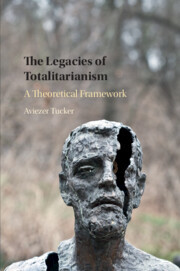The Legacies of Totalitarianism A Theoretical Framework
Langue : Anglais
Auteur : Tucker Aviezer

This book provides the first political theory of post-Communist Europe, discussing liberty, rights, transitional justice, property, privatization, and rule of law.
The first political theory of post-Communism examines its implications for understanding liberty, rights, transitional justice, property rights, privatization, rule of law, centrally planned public institutions, and the legacies of totalitarian thought in language and discourse. The transition to post-totalitarianism was the spontaneous adjustment of the rights of the late-totalitarian elite to its interest. Post-totalitarian governments faced severe scarcity in the supply of justice. Rough justice punished the perpetrators and compensated their victims. Historical theories of property rights became radical, and consequentialist theories, conservative. Totalitarianism in Europe disintegrated but did not end. The legacies of totalitarianism in higher education met New Public Management, totalitarian central planning under a new label. Totalitarianism divorced language from reality through the use of dialectics that identified opposites and the use of logical fallacies to argue for ideological conclusions. This book illustrates these legacies in the writings of Habermas, Derrida, and Žižek about democracy, personal responsibility, dissidence, and totalitarianism.
Introduction; 1. The adjustment of elite rights to interests; 2. Post-totalitarian rough justice; 3. Rough justice: post-totalitarian retribution; 4. Rough and shallow: post-totalitarian rectification; 5. The new politics of property rights; 6. Old to new totalitarianism: post-totalitarian higher education; 7. Short-circuiting reason: the legacies of post-totalitarian thinking; Conclusion. Only dissidents can save us now.
Aviezer Tucker is a philosopher and social scientist, author of The Philosophy of Politics of Czech Dissidents from Patočka to Havel (2000) and Our Knowledge of the Past: A Philosophy of Historiography (2004). He published extensively in journals such as The American Interest, Critical Review, Foreign Affairs, History and Theory, Independent Review, Philosophy, Politics Philosophy and Economics, and Telos. He spent a decade working and conducting research in post-totalitarian Europe at the Central European University in Prague, Palacký University, and Charles University in the Czech Republic. He also taught and held fellowships at Columbia University, New York University, Trinity College, the Australian National University, the University of Texas, Austin, and Harvard University.
Date de parution : 11-2022
Ouvrage de 270 p.
15.2x22.9 cm
Disponible chez l'éditeur (délai d'approvisionnement : 14 jours).
Prix indicatif 30,28 €
Ajouter au panierDate de parution : 10-2015
Ouvrage de 272 p.
15.5x23.5 cm
Thème de The Legacies of Totalitarianism :
© 2024 LAVOISIER S.A.S.



